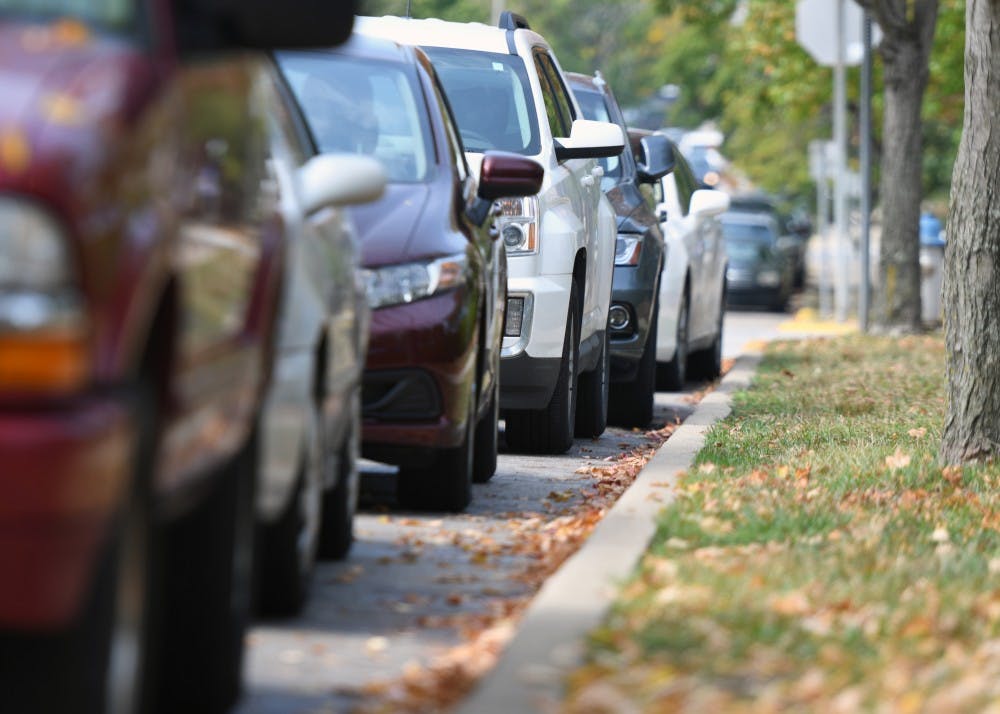IU junior Tricia Place checked her bedroom, overturned her living room and searched her friend’s houses, but she could not find her wallet.
But then she checked her car and found that an auxiliary cord was also missing.
“I wouldn’t take that out,” she said. “So when I saw that, I realized something was off, and then it hit me that they had been stolen from my car.”
On Aug. 28, Place found that her auxiliary cord and her $100 black Calvin Klein wallet had been stolen from her locked car. Her credit card, debit card, cash and gift cards had also been plucked from her car’s glovebox.
Place was not the only student to have her belongings stolen from her car this semester. In fact, the Bloomington Police Department has faced a sudden spike in thefts from vehicles in the last few weeks, BPD Lt. John Kovach said.
“It ebbs and flows,” he said. “Now the students are back, so there are more cars and more opportunities for people to steal and more thefts happen.”
Place said the theft from her car took place in the parking lot outside her apartment on East Varsity Lane, just next to the stadium. She said the large number of college students and the fact that the car was not parked in the open were what made the theft surprising.
“It makes sense that someone would target an area with a lot of college students who may leave their cars unlocked, but I was shocked because there’s people walking around all the time,” she said. “I was surprised no one saw anything.”
But Kovach said areas with many students, especially near apartment complexes and neighborhoods, are hotspots. He said most of the recent thefts have occurred north of 10th Street and in the neighborhoods around North College Avenue and North Walnut Street.
While the BPD has seen an increase in people stealing items from cars, there have also been cases in which the entire car is stolen.
IU student Trae Bennett said his car was stolen. He said he had his keys with him, so the car was likely hot-wired.
He said he found some of his belongings thrown fom his car and strewn onto a driveway a few blocks south of campus, adding that he had a friend whose laptop and purse were stolen from her car.
Both thefts took place by their off-campus homes in student neighborhoods where thefts are common.
“We are still shocked that this occurred so close to campus, in our own backyard as many students live in the area,” he said in an email.
When Place realized her wallet had been stolen, she said she panicked. She called her mom, and she frantically called her bank to cancel her stolen credit card.
It was a week and a half before she was able to get her new credit card and a week before she got her temporary license. She’s still waiting on her debit card to come in the mail, and she doesn’t have a wallet.
She spent her week without a license worrying about police officers pulling her over and realizing she did not have a license with her. Without her credit card, debit card or cash, she had to ask her friend to pay for her groceries.
“I felt so bad, but I just needed something to get through the week, and I didn’t have access to any funds,” she said.
After he realized his car had been stolen, Bennett said he filed a report with the BPD and checked with towing companies. Nothing came of it, he said.
Place also reported the incident to BPD, but she said never heard anything back.
“I know there isn’t much they can do at this point,” she said.
Kovach said it is uncommon to return stolen items like cash or clothes because it is difficult to identify the rightful owner. For electronics like laptops and phones, Kovach said it’s important to write down the serial number. That way, if it is stolen, it is easier for police to track it.
While it is difficult to return smaller stolen items, Kovach said he still encourages people to report thefts, no matter how insignificant they may seem.
He said these thefts happen in clusters when someone picks through entire parking lots of cars. When people report thefts, it allows police officers to identify these clusters of thefts and station more patrol officers in those areas.
“Don’t worry that you’re going to waste our time with something insignificant,” he said. “Just report it.”
Place said she always locks her car, but many students do not.
Kovach said 80 percent of the thefts from vehicles in August and early September were from unlocked vehicles. He said unlocked cars make it difficult for patrol officers to identify thefts.
“When someone bashes in a window, you notice and can do something,” he said. “But when someone’s just opening up a door to steal something, it could look totally normal, just like someone grabbing something they forgot from their car.”
After the incident, Place said she no longer leaves anything valuable in her car.
Kovach said taking cell phones, wallets, money or other valuables with you when leaving a car or putting these items in the trunk can prevent thefts because thieves may break windows to get in if they see something valuable.
“Even if you’re dropping by your house for a couple minutes, take everything with you,” he said. “We all get distracted. Those couple minutes may turn into a half hour and maybe your stuff will be gone when you get back outside.”
Kovach also suggested parking near street lights to make cars more visible, but the best prevention measure is to lock doors and to not leave anything in cars, he said.
“We preach that and preach that and preach that,” he said. “Just do it and make it a habit.”





